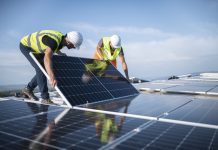Dave Howell, U.S. Department of Energy’s Principal Deputy Director of the Manufacturing and Energy Supply Chains Office and Director of the Vehicle Technologies Office (VTO) highlights EV battery research for transportation
Transportation accounts for approximately 30% of U.S. energy needs and generates the largest share of the country’s greenhouse gas (GHG) emissions. Decarbonising the transportation sector is crucial to the Biden-Harris Administration’s goal of a net-zero emissions economy by 2050. In August 2021, President Biden signed an Executive Order that set an ambitious target to make half of all new vehicles sold in 2030 zero-emission vehicles, including battery electric, plugin hybrid electric or fuel cell electric vehicles.
To get there, lower-cost, durable, and safe advanced batteries to power electric vehicles (EVs) are needed. Advanced batteries power our daily lives, from consumer electronics to national defense, enabling electrification of the transportation sector and providing stationary grid storage vital to tomorrow’s clean energy economy. The U.S. Department of Energy (DOE) is focusing on advanced battery research for EVs and stationary grid applications.
DOE’s Vehicle Technologies Office is leading the charge on EV battery research
DOE’s Vehicle Technologies Office (VTO) funds a broad portfolio of research, development, demonstration, and deployment (RDD&D) projects to develop affordable, efficient, and clean transportation options to tackle the climate crisis and accelerate development and widespread use of innovative transportation technologies. VTO’s battery RDD&D has yielded breakthroughs in cost and performance over the past decade, reducing the cost of a battery pack 85% from around $1,000/kWh to $133/kWh while driving down weight and enhancing manufacturability. VTO’s advanced battery research is aimed at new battery chemistries and cell technologies that cost even less ($60/kWh or lower) and go farther (range of 300 miles or more) while charging faster (charging time of 15 minutes or less).
Building a battery supply chain here at home
DOE recognises that cost-effective advanced batteries need a domestic supply chain to back them up, so that we continue to see the growth of U.S. battery manufacturing jobs. Our efforts are leading the way to reduce U.S. dependence on critical materials such as lithium and cobalt by reducing the amount of these materials needed for battery production, developing substitute materials, and recycling materials already in use.
In response to President Biden’s Executive Order on America’s Supply Chains, last June DOE issued a 100-day review report of the large capacity battery supply chain, which recommended establishing domestic production and processing capabilities for critical materials to support a fully domestic end-to-end battery supply chain. The report underscored that both the public and private sectors play critical roles in strengthening our supply chains, the need for investment in R&D, and the importance of accelerating our ability to move innovations from the lab to the marketplace.
The Federal Consortium for Advanced Batteries (FCAB) is providing the framework for cooperation and coordination among federal agencies that have a stake in developing advanced battery technologies and establishing a domestic supply chain. DOE led the FCAB’s efforts in releasing the National Blueprint for Lithium Batteries 2021-2030 that codifies the findings of the 100-day battery supply chain review and details how federal investments will position the United States to lead an emerging advanced battery market. This February, DOE released a whole-of-government strategy to strengthen America’s clean energy supply chain and 13 deep-dive assessments on technologies and topics critical to the clean energy transition.
The Bipartisan Infrastructure Law is investing in battery manufacturing
The Bipartisan Infrastructure Law provides a once-in-a-generation investment in America’s infrastructure. It will invest over $7 billion to accelerate innovations and facilities across the battery supply chain, from materials refining and processing to recycling and second-life applications. On May 2nd, DOE announced two funding opportunities to invest $3.16 billion to strengthen the U.S. supply chain for advanced batteries and energy storage. The Battery Materials Processing and Battery Manufacturing funding opportunity will support the creation of new, retrofitted, and expanded commercial facilities and demonstrations that manufacture battery materials, cell components and batteries, along with battery recycling. The Electric Drive Vehicle Battery Recycling and Second Life Applications funding opportunity will support second-life applications for batteries once used to power EVs and new processes for recycling materials back into the battery supply chain.
The funding opportunities mark the first to be released as a collaboration between DOE’s Office of Energy Efficiency and Renewable Energy and the new Office of Manufacturing and Supply Chains, created by DOE’s organisational realignment to ensure that the Department has the structure needed to effectively implement the clean energy investments in the Bipartisan Infrastructure Law and the Energy Act of 2020. Together, DOE’s research, partnerships, and investments in advanced batteries are ensuring a strong and secure advanced battery supply chain in the United States in support of a clean energy future benefiting all Americans.











